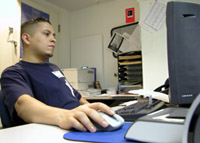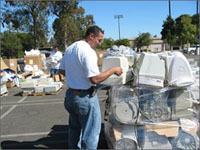WASHINGTON, D.C., April 21, 2004 — Until a few months ago, Wilfredo Canales’ 7-year-old daughter knew more about computers than he did. But as the little girl watched him formatting a report in Microsoft Word on a recent evening, she told him, “Daddy, you’re cool! I’m so proud of you.”

Wilfredo Canales in the computer lab at the Latin American Youth Center, Washington, D.C.
The turning point for Canales, a 26-year-old waiter, came when he enrolled in a free computer course at the nonprofit Latin American Youth Center (LAYC) here. For two hours a day, twice a week, Canales learns to use Microsoft Office 2003 applications such as Word, Excel and Outlook as well as Microsoft Internet Explorer. These new skills have enabled Canales to help his daughter with her homework and inspired him to pursue more training toward a possible career in restaurant management — something he couldn’t have imagined before.
“These classes are really changing my life, the way I see things,” says Canales, who recently bought a home computer. “I feel like the world is smaller than I thought, now that I can get on the Internet and find whatever I want to know.”
Here in the U.S. capital city, more than 110 adults like Canales have participated in the organization’s Computer Literacy Program since the LAYC launched its first courses in early 2003 using a US$50,000 grant from Microsoft’s Unlimited Potential (UP) program, a global initiative focused on providing technology skills for underserved people through community-based technology and learning centers (CTLCs). Tonight, at a graduation ceremony for Canales and others enrolled this winter, Microsoft representatives will present another $50,000 check to the LAYC as part of a second round of UP grants totaling more than $25 million in cash and software for more than 70 nonprofit organizations. Microsoft has distributed nearly $50 million in cash and software to more than 150 programs in 45 countries since the program was initiated in May 2003.
In an effort to promote digital inclusion around the world, Microsoft is providing these community-based centers with cash, software, curricula and technology assistance to help eliminate barriers to technology access and educational assistance faced by residents of underserved communities. In addition to monetary grants and software donations for CTLCs, Unlimited Potential offers technology curriculum materials and will soon provide a worldwide support network for organizations that are working to narrow the technology skills gap.
“The locally based programs receiving Unlimited Potential grants are each creating remarkable economic and social opportunities through technology training in the communities they serve,” says Akhtar Badshah, senior director of Community Affairs at Microsoft. “Their work is essential in ensuring everyone has the skills needed to succeed in today’s knowledge-based economy.”
Since 1974, the LAYC has served primarily low- and moderate-income families in the U.S. capital area with programs spanning academics, job training, health education, social services, leadership development, substance abuse prevention, housing, arts, humanities and recreation. When the center first opened its computer lab several years ago, however, the facility wasn’t being used as much as LAYC Executive Director Lori Kaplan had envisioned.
“Organizations such as ours have had great success attracting donations of hardware and software, but it can be much tougher to secure funding to hire a qualified person who can work with kids and families in using the technology,” says Kaplan. “So for a while, we had a lab but no formal curriculum and teaching environment.”
Last year’s $50,000 Unlimited Potential grant allowed the LAYC to hire Abner Sorto, who taught computer courses in his native Costa Rica before coming here three years ago. Kaplan says Sorto, who teaches five classes each week, also has been instrumental in designing the course materials, recruiting students and expanding the scope of available technology within the lab.
Originally conceived to serve 20 to 25 parents annually, the Computer Literacy Program expects to enroll at least 125 adults this year. Also, the LAYC had more than 60 youths enrolled in after-school classes and more than 100 in its summer programs last year. Other plans that will be supported by this year’s Unlimited Potential grant include adding more advanced courses – such as preparing students to earn an A+ certification in installing, maintaining, customizing, and operating personal computers – and opening a second computer lab in an adjacent neighborhood.
“A lot of the adults come here because they want to improve their job prospects. They realize that if they’re not computer-literate, it’s going to limit everything they do,” says Kaplan. “Through Unlimited Potential, Microsoft has been a catalyst for us to turn our computer lab into a vital community resource that reaches far more people than we could have without that support.”
On the other side of the country, in San Pablo, Calif., Unlimited Potential supports another community-based technology training program called Street Tech in training an average of 60 to 100 adult students per year for entry-level jobs in the information technology industry. A $30,000 Unlimited Potential grant earlier this year helped Street Tech launch two new offerings — a computer refurbishment program and a technical support business, ReliaTech — that provide Street Tech clients and recent graduates with hands-on experience to prepare them for high-tech careers.
“Our program is designed to make sure that people who otherwise wouldn’t be able to afford technology training and job placement assistance can receive access to those advantages,” says Paul Lamb, executive director of Street Tech. “Beyond the financial barrier, the biggest challenge for many of the people in the communities we serve is just fear itself — they’ve never had access to technology, and so they’re uncertain about it. They don’t really see the benefits of learning about technology, especially if they’re already struggling to pay their bills and take care of their families.”
Established in 1999, Street Tech serves clients from disadvantaged communities in the San Francisco Bay Area. Its technical training classes range from a three-month Computer Apprenticeship course, which focuses on introductory PC repair and maintenance, to more advanced A+ and Microsoft Certified Professional (MCP) certification programs. Street Tech also offers a Professional Skills class that covers interpersonal communication, time management, critical thinking, effective study habits and other abilities that are essential for thriving in the IT field.

Randal Strickland gathers donated PCs for Street Tech in San Pablo, Calif.
“That was the kind of preparation that really helped me succeed in job interviews and in working with customers,” says Randal Strickland, a 2002 graduate of Street Tech who now teaches there and serves as its technology programs coordinator. Before he entered Street Tech, says Strickland, “I couldn’t have pictured myself working in an IT department of any capacity.”
Released from prison in January 2001 after serving more than 10 years of a 20-year sentence, Strickland wanted to build upon the modest amount of computer know-how he had acquired as an inmate but wasn’t sure where to turn. An elder at his church told him about Street Tech, and Strickland started attending classes in July 2001. By the following March, he had an A+ certification and a paid internship with Chevron-Texaco Corp., helping to install several thousand PCs running the Microsoft Windows XP operating system and to upgrade servers to Microsoft Windows Server 2000 at the company’s Richmond, Calif., plant.
“Getting that internship had everything to do with the people skills, salesmanship and self-confidence that I developed at Street Tech,” says Strickland, who also assisted with IT projects at a few other companies and worked part-time at a computer repair shop before returning to Street Tech in summer 2002.
“I came back here because I realized that there were a lot of folks like me who were still trying to get the same kinds of breaks that I had,” the 40-year-old says. “This is the most challenging job I’ve had in my life, but also the most incredibly fulfilling.”
Despite the lingering economic downturn in some sectors of the high-tech industry, Street Tech continues to place more than 60 percent of its graduates in either outside jobs or the ReliaTech consulting business, says Lamb. Also, nearly a third of the graduates return for additional training or enroll in advanced degree programs at a community college or university.
“Microsoft’s support in recent years, which includes donating more than $100,000 worth of software licenses, has helped us improve the quality of our training programs,” says Lamb. “As a result, we’re achieving a higher rate of success in placing our graduates in jobs outside of Street Tech as well as in our ReliaTech business.”
As a Microsoft Authorized Refurbisher, Street Tech has restored and redistributed more than 230 PCs to other nonprofit organizations and low-income residents — including 80 computers that were shipped to Africa last January for a school that a Bay Area man had helped build in his hometown in Ghana.
“Programs such as these would be much more difficult to launch without the support of Microsoft, not only here but in communities all over the world,” says Lamb. “I’m very impressed with the extent of forethought and resources that Microsoft has put into the Unlimited Potential initiative to help underserved individuals overcome the digital divide. We’re excited about the opportunities to participate in that effort.”




